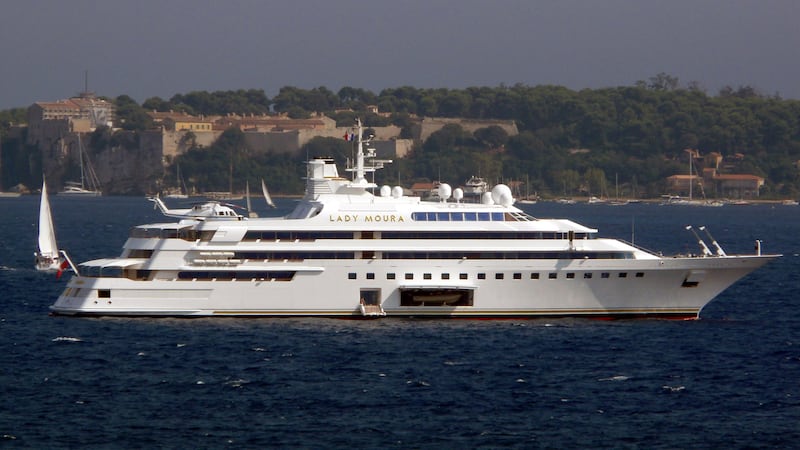WAS delighted when I first met Brian Desmond Hurst through the pages of The Empress of Ireland, a somewhat controversial book by author Christopher Robbins.
In it, Hurst is portrayed as a tall, distinguished film director, somewhat austere, in his early eighties with pale blue eyes, a shock of flowing white hair and thick bushy eyebrows.
I wish I had known him in person. A boy who grew up in Belfast, the son of a blacksmith who worked on the Titanic; a boy who, more than 100 years ago, at the age of 12 earned four and sixpence a week delivering groceries, and who left school at 13 to work in Bloomfield Linen Factory learning to weave fine tablecloths.
The evenings were spent in music halls in north Belfast, braving the Catholic boys on the way home or watching fights on the streets off Newtownards Road Journalist Christopher Robbins was 27 when he went to work for Hurst as a scriptwriter but he also began to write down their experiences together and this is where the controversy lies - are these unofficial memories entirely accurate?
There's no doubt that in the mid-70s, Robbins found Hurst an irresistible character, generous to a fault, travelling the world surrounded by fascinating people. During his years living in London, breakfast was usually Champagne and fresh orange juice, supper in a swanky restaurant might mean a starter of lemon pie, two more slices for the main course and another for pudding.
He dressed for his part, adopting the persona of a businessman in a three-piece striped suit when necessary or for more unorthodox happenings he relaxed as the bohemian he was. A man of all persuasions - Anglophile Ulsterman, a Protestant who had converted to Catholicism and a homosexual who loved women. Only people to have two Blue Plaques erected locally in their honour - Hurst and Francis McGinn, pioneer for the deaf community. Hurst's, in Queen's Film Theatre, Belfast, reads: "Directors Guild of Great Britain Brian Desmond Hurst 1895-1986 Film Director born in Belfast."
On the same day a second plaque was unveiled at his birthplace, 23 Ribble Street in east Belfast. Last October two new sound stages at Titanic Studio were named after William MacQuitty and his colleague in cinema, Brian Hurst, Ireland's most prolific film director of the 20th century, with more than 30 films to his credit.
Following his education at the College of Journalism in Belfast, Ecole des Beaux Arts (Paris) and The Ontario College of Art in Toronto, Brian moved to Hollywood where he quickly rose from set artwork to movie production.
I imagine for Robbins it was hard to separate fact from fiction when writing his fascinating book which is a revelation of the film industry and of the life of an extraordinary man of great panache.
Hurst was outrageous, camp and colourful but beneath the theatricality there was a steely sense of purpose, to make the best films. It was an ambition realised with titles including Riders to the Sea; Ourselves Alone - set during the Irish War of Independence, censored in the south and banned in Northern Ireland; Scrooge, starring Alistair Sim; Tom Brown's Schooldays; Malta Story with Alec Guinness; and Playboy of the Western World - titles that conjure up the legends of cinema.
Born Hans Hurst, he changed to Brian during the First World War when, in 1914, he signed up with his mate Bobby McKenzie and joined the Royal Irish Rifles to fight at Gallipoli.
The chapter on Gallipoli is breathtaking. Robbins records Hurst's words, from trying to enlist in Belfast to fighting on the front line. Hurst regaled the writer with stories of brothels and grapes picked in deserted vineyards. It sounded like a breeze, Robbins says until the director asked the
young man what he knew about Gallipoli. Nothing, was the reply. And so the tragic story unfolds. He tells it in detail - the bloodbath, the hand-to-hand fighting with bayonets, torture and abuse. It's a chapter that's moving to the point of tears. I certainly was left in no doubt of the bravery of the Belfast boy who was to became famous as a film-maker.
He worked with all of the stars, directing Alastair Sim, Alec Guinness, Alexander Corder, Noel Coward and Michael Redgrave.
His mentor was John Ford who introduced him to the film industry and was to influence his work.
The roll call goes on - Vanessa Redgrave, Richard Attenborough, Siobhan McKenna and Dirk Bogarde - friends with them all, as he was with Lord Louis Mountbatten.
His 1946 film Theirs is the Glory is acknowledged to be the only feature film to accurately portray the events of the Battle of Arnhem. It was the biggest-grossing war film in the UK for nearly a decade, a war film like no other as Hurst took 200 members of the 1st Airborne back to Arnhem and Oosterbeek to reprise their role in the battle with a realism that could only be achieved using those who had firsthand knowledge.
Hurst was proud of it: "The film is my favourite because of the wonderful experience of working with soldiers and because it's a true documentary reconstruction of the event. I say without modesty it is one of the best war films ever made."
n Brian Desmond Hurst's nephew and biographer Allan Esler Smith will be introducing a special showing of Theirs is the Glory at North Down Museum in Bangor on September 25 at 1pm as part of the Aspects Festival. Details http://aspectsfestival.com/event/ details/film-theirs-is-the-glory For more on Hurst see www. briandesmondhurst.org or listen to Allan's RTE Radio 1 documentary, An Irishman Chained to the Truth where he pieces together the fact and fiction from within Hurst's own memoirs, which will be published next year.


